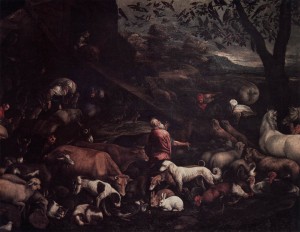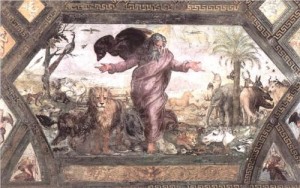Contemporary science tells us that non-human animals have been struggling to survive on this planet for billions of years. Does this equate to a vast amount of animal suffering which is incompatible with the existence of a loving creator?
1. We can state the problem of evil from animal suffering quite briefly:
A: There exists a vast amount of animal suffering which an omnipotent, omniscient being could have prevented without thereby losing some greater good or permitting some evil equally bad or worse.
B: An omniscient, wholly good being would prevent the occurrence of a vast amount of animal suffering, unless it could not do so without thereby losing some greater good or permitting some evil equally bad or worse. Therefore,
C. There does not exist an omnipotent, omniscient, wholly good being.
 2. What does it mean to say that “there exists a vast amount of animal suffering”? There are significant difficulties with meaningfully aggregating the suffering of many individuals. Which is preferable: to live in a world in which two thousand people experience one sting? Or to live in a world in which one person experiences a thousand stings? We might attempt to calculate the total amount of suffering using classical utilitarianism’s hedonic calculus: the severity, duration and instances of pain are added to give a total. But the problem with this approach is that the “vast amount of intense suffering” becomes an experiential evil which no-one actually experiences.
2. What does it mean to say that “there exists a vast amount of animal suffering”? There are significant difficulties with meaningfully aggregating the suffering of many individuals. Which is preferable: to live in a world in which two thousand people experience one sting? Or to live in a world in which one person experiences a thousand stings? We might attempt to calculate the total amount of suffering using classical utilitarianism’s hedonic calculus: the severity, duration and instances of pain are added to give a total. But the problem with this approach is that the “vast amount of intense suffering” becomes an experiential evil which no-one actually experiences.
Pains can only be summed in the experience of one conscious being. It is individuals who undergo suffering. So Wittgenstein observed that “the whole earth cannot be in greater distress than one soul”, for no one can experience the pain of more than one conscious being. And CS Lewis noted that when we have reached the maximum that a single person can suffer we have reached all the suffering there ever can be in the universe.
3. That said, there are as many “problems of evil” as there are individuals experiencing evil. God needs a justifying reason for each of those experiences. So the more individuals who suffer, the worse the problem of evil is for theism. But if God has a sufficient justifying reason to permit an animal death in one situation, then he has a sufficient justifying reason to allow an animal death in every relevantly similar situation. Each similar episode of pain is justified by the same reason. To illustrate: if the pain of a needle prick is justified because it immunizes the person who feels it, immunisation can justify ten thousand or ten million. So a vast number of individuals feeling pain could be compatible with theism, if the theist can offer reasons for pain which cover vast numbers of individuals.
4. What does it mean to say that animals suffer? When discussing animal suffering, theists and sceptics must avoid implausible interpretations of animal suffering. The theist must not be tempted to argue (or imply) that animals are not consciously aware of their pains. Explanations of animal behaviour which appeal to comprehensible phenomenal states like “pain” are simpler than complex “stimulus–response” explanations.
5. The sceptic must not be tempted to overstate the problem for theism by anthropomorphising the experiences of animals.Complex psychological states such as “dread”, “regret” or “sorrow” seem to require a very complex nervous system – at a minimum, first-order brain states must be processed by higher cortical regions to create second-order states about those first-order states. Most animals lack the higher cortical regions capable of such processing the information to produce such beliefs, propositional attitudes and emotions. Furthermore, while many animals might suffer unpleasant phenomenal states which signal tissue damage (ie. “conscious pains”), it is not at all clear that any non-human animal suffers anything like the human psychological state of “intense, personal suffering”. (Although many animals must have complex and marvellous experiential lives, which are worthy of protection).
We have no reason to think that animal suffering is commensurate with human suffering.Unlike animals, humans are self-conscious, refer to themselves in the first person, and actively assert and value their own individual desires, moral goals and life-projects. Non-human animals lack rational individuality; and if they cannot conceive of themselves as rational individuals, they cannot conceive of each other as individuals. This means that they cannot form deep personal attachments; and this means that they cannot suffer personal loss as humans do. There is no dread of death, no regret or repentance, in the animal world.
6. So the Christian should acknowledge that animal suffering is real, and should be alleviated when possible. One purpose of animal suffering might be to teach us compassion: indeed, it seems to be in our nature to nurture and to care for life. And it seems impossible to do this if we treat all animals as automata. The sceptic must acknowledge the dangers of viewing nature as a heartless, grind-house horror. If we view nature as a heartless, witless serial killer we will be ,at worst, hostile to nature, and at best morally indifferent. We could be tempted to aggressively and radically interfere in the natural world. A more humane, moral, rational and sane view of nature must be sought.
7. We ought to marvel at the living world. We must respect the integrity, drama, stability, beauty and creativity of the natural world as intrinsically good. We should not merely value the living world it because it is necessary for our existence. There are objective aesthetic values in the intricate structure of living organisms, in the dramatic competition between predator and prey, in the dynamism of life and in the remarkable complexity of ecosystems.
8. If different animals did not compete for resources, we would not have a complex, diverse, interconnected web of life on our planet. Without pain, many animals could not survive to reproduce. Without death, the world would be rapidly overpopulated by animals. Without predation, the animal world would lose much of its drama. So there are general features of the living world which could justify animal suffering.
Now, it is not possible for the Christian to offer such generic, utilitarian justifications for human suffering. Christianity teaches that God does not merely value the human race; Christianity teaches that God loves each individual person passionately. Some suffering seems necessary for free-will, and virtues such as faith, compassion and courage. However, this does not explain why a loving God would allow an individual to suffer so horrendously that she never recovers, and reasonably believes that she would have been better never existing.
However, according to Christianity, God does not value each individual animal in the same way. the individual animal is not as important as the complex natural system of which it is a part. This suggests a “life-centred” or ”holistic” environmental ethic. We should act to preserve biotic communities and ecological systems rather than individual animals.
9. Can dogs go to heaven? If an animal lacks rationality, lacks consciousness of its own individuality, does not create its own biographical life through conscious moral choices and does not have deep, lasting personal attachments, then it is very difficult to see what benefit an afterlife would be to that animal. But it also follows that the same animal cannot experience an horrendous evil. Horrendous evils are moral and existential horrors: they shock, challenge and undermine people’s sense of worth, their beliefs about human significance, their expectation of “how things should be”. But animals have no moral expectations or existential needs. And an animal which lacks rational individuality cannot make a judgement about the overall value of its life.
10. However, suppose that some animals do have something commensurate with human individuality, and do experience intense suffering or horrendous evils. It is worth noting that theologically orthodox Christians from Martin Luther and John Calvin, to John Wesley and CS Lewis have argued that some form of afterlife might be available for some animals. Romans 8 teaches that the anima l world will “groan and travail” until God creates the new heavens and new earth. Colossians 1 asserts that God will reconcile all creation to himself through Christ. The thought is that all creation will participate in a resurrection when Christ returns. So, if there are higher animals who can experience something which approximates individual rationality, then perhaps there will be a place in the new creation for such animals.
l world will “groan and travail” until God creates the new heavens and new earth. Colossians 1 asserts that God will reconcile all creation to himself through Christ. The thought is that all creation will participate in a resurrection when Christ returns. So, if there are higher animals who can experience something which approximates individual rationality, then perhaps there will be a place in the new creation for such animals.
Furthermore, in Christian theology, the present heaven’s and earth will be physically transformed into the new heavens and new earth. So the present physical world will form part of the foundation of new heaven and new earth. The history of our universe, and our planet, forms part of the character of the new creation. And, presumably, animals will be part of the new creation. So no animal has lived and died in vain. Animal life will continue forever, its future shaped (in part) by its history.
